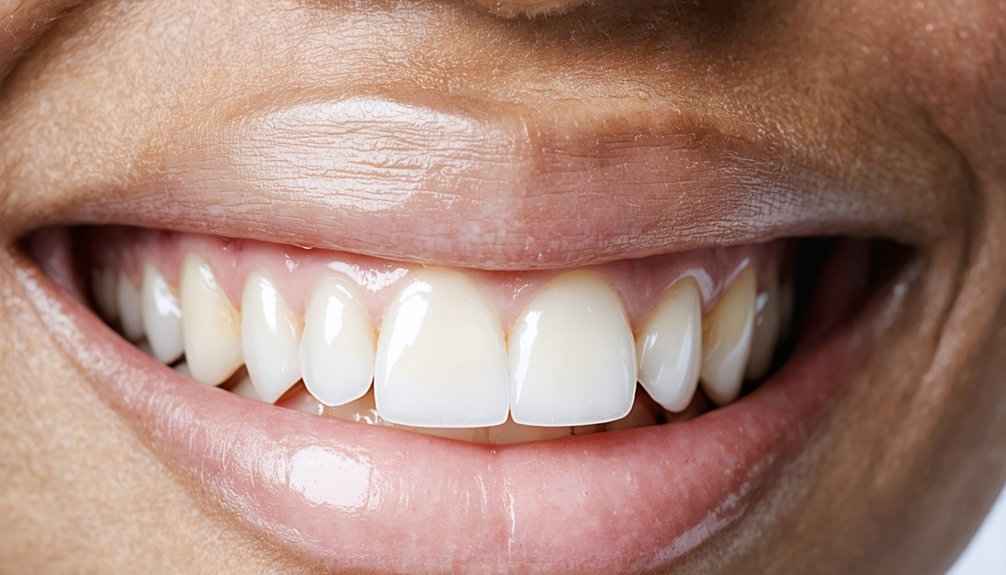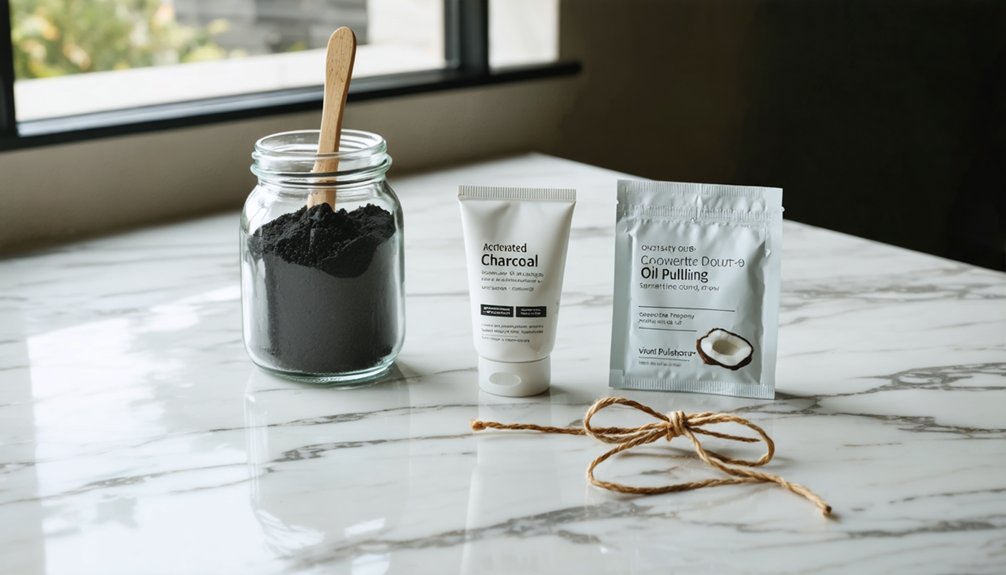If you have sensitive teeth, you’ll want to choose whitening options specifically designed to minimize discomfort. Consider gentle over-the-counter products like Rembrandt 1 Week Whitening Kit or Crest 3D White Whitestrips Gentle Routine, which include desensitizing agents. Professional treatments with custom trays allow precise application and adjustable concentrations. Natural methods like oil pulling or high-fiber foods can help maintain whiteness. Understanding your sensitivity level and consulting a dentist will help determine your ideal whitening approach.
Key Takeaways
- Use gentle over-the-counter whitening strips designed specifically for sensitive teeth, like Crest 3D White Whitestrips Gentle Routine.
- Consider professional whitening treatments with custom trays, allowing dentists to control gel concentration and application based on sensitivity.
- Try natural whitening methods like oil pulling with coconut oil or eating high-fiber foods that naturally clean teeth surfaces.
- Choose whitening toothpaste containing potassium nitrate or fluoride to minimize sensitivity while gradually brightening teeth.
- Start with low-concentration peroxide gels and incorporate desensitizing treatments before, during, and after whitening procedures.
Understanding Tooth Sensitivity and Whitening
While many people desire whiter teeth, those with tooth sensitivity must approach whitening with extra caution. Tooth sensitivity affects up to 74% of the global population and occurs when dentin becomes exposed due to enamel erosion, gum recession, or mechanical wear. Winter temperatures can make sensitivity worse, as cold air exposure through mouth breathing often triggers pain.
Whitening treatments require special care for sensitive teeth, as exposed dentin affects a majority of people worldwide through various forms of dental wear.
When whitening agents contact exposed dentin, they can trigger sharp, immediate pain through fluid movement in dentinal tubules. Using a soft-bristled toothbrush can help minimize sensitivity during whitening treatments.
You’ll need to understand that whitening products, particularly those containing strong peroxides, can amplify sensitivity symptoms. If you already experience sensitivity, you’re at higher risk of discomfort during whitening treatments.
Contributing factors like acidic food consumption, smoking, and poor oral hygiene can worsen your condition. Professional supervision becomes essential, as untreated cavities or gum issues can greatly increase your risk of whitening-related sensitivity.
Evaluating Your Candidacy for Teeth Whitening
Before pursuing teeth whitening treatments, you’ll need a thorough evaluation to determine if you’re an ideal candidate for the procedure. Your dentist will assess your overall teeth health, including checking for cavities, gum disease, and exposed roots that require treatment before whitening can begin. Sensitive teeth may experience increased discomfort during treatment, requiring special consideration.
They’ll also examine any existing dental work, as crowns, veneers, and fillings won’t respond to whitening agents. Setting realistic treatment goals is crucial for patient satisfaction.
Understanding your stain types is essential for treatment success. While surface stains from coffee or tobacco typically respond well to whitening, deeper intrinsic stains may require alternative approaches.
If you’re under 16, you should avoid whitening treatments altogether. Additionally, lifestyle factors like smoking or frequent consumption of staining beverages can greatly impact your results, so you’ll need to reflect on these habits when evaluating your candidacy.
Gentle Over-the-Counter Whitening Solutions
For those with sensitive teeth, several gentle over-the-counter whitening solutions offer effective results without causing significant discomfort.
These products feature gentle formulations specifically designed to minimize irritation while still achieving noticeable whitening results. The Rembrandt 1 Week Whitening Kit demonstrated that 100% of testers reported no tooth sensitivity during use. A dental exam is recommended before starting any whitening treatment to check for underlying health issues.
Modern whitening formulas balance powerful stain-fighting ability with gentle ingredients, delivering bright smiles without uncomfortable sensitivity.
When selecting a whitening solution for sensitive teeth, consider these key options:
- Crest 3D White Whitestrips Gentle Routine, which includes desensitizing tools and requires only 30 minutes of daily wear
- Sensodyne Extra Whitening Toothpaste, combining gradual whitening with protective ingredients to reduce sensitivity
- Zimba Teeth Whitening Strips, which come with a desensitizing pen and feature enamel-safe ingredients
These products incorporate natural ingredients like sage oil and coconut oil instead of harsh chemicals, making them suitable alternatives to traditional whitening treatments.
You’ll find these solutions particularly effective when used according to their specified durations and frequencies.
Professional Whitening Treatments for Sensitive Teeth
Although sensitive teeth require special care during whitening treatments, professional dental procedures offer controlled and customizable options that minimize discomfort while maximizing results.
An initial dental exam is essential before starting any whitening procedure to determine if you are a suitable candidate for treatment.
In-office treatments can lighten teeth up to eight shades in a single visit, with dentists carefully monitoring the process and applying desensitizing agents when needed.
For a gentler approach, you’ll find custom trays particularly effective. These professionally-fitted devices guarantee precise gel application while reducing gum irritation. The treatment typically requires one to two weeks of daily wear for optimal results.
Your dentist can adjust the concentration and treatment duration based on your sensitivity level. They’ll also evaluate your teeth beforehand to identify potential sensitivity triggers and recommend appropriate preventive measures.
Whether you choose laser whitening or traditional bleaching methods, your dental professional can tailor the treatment protocol to achieve peak results while protecting your sensitive teeth.
Natural and DIY Whitening Methods
Natural whitening methods offer a gentler alternative to professional treatments for those with sensitive teeth.
When exploring these options, it’s crucial to prioritize techniques that won’t compromise your enamel or increase sensitivity.
Consider these proven gentle approaches:
- Oil pulling with coconut oil, which contains antimicrobial properties to help remove bacteria while being non-abrasive on sensitive teeth. Lauric acid in coconut oil provides the natural antimicrobial benefits during oil pulling.
- Brushing with turmeric paste, which offers mild antibacterial benefits without harsh abrasives that could irritate sensitive areas.
- Using high-fiber foods like apples and carrots that naturally clean teeth surfaces while being gentle on enamel.
Remember to monitor your teeth’s response to any natural treatment and consult your dentist before starting new whitening methods.
While these approaches may take longer to show results, they’re typically safer for sensitive teeth than aggressive whitening procedures.
Using a soft-bristled toothbrush is essential when implementing any whitening method to protect your enamel and minimize sensitivity.
Maintaining White Teeth While Managing Sensitivity
Successfully maintaining white teeth while managing sensitivity requires a strategic balance of protective measures and careful product selection.
Establish a consistent whitening routine using dentist-approved products specifically formulated for sensitive teeth, such as low-concentration peroxide gels or specialized whitening strips.
Your sensitivity management strategy should include regular use of desensitizing toothpaste containing potassium nitrate or fluoride.
Avoid common staining agents like coffee, tea, and red wine, or rinse immediately after consumption.
Schedule professional cleanings to maintain results while preventing sensitivity flare-ups.
For ongoing protection, continue using fluoride treatments and calcium phosphate applications as recommended by your dentist.
When selecting maintenance products, choose gentle formulations that won’t compromise your enamel or trigger discomfort.
Frequently Asked Questions
Can I Whiten My Teeth While Wearing Braces or Dental Restorations?
You’ll want to skip braces whitening since it causes uneven results. For dental restorations, they won’t respond to bleaching agents – wait until your braces come off or consult your dentist first.
How Long Should I Wait to Whiten Teeth After Dental Work?
You’ll need to wait at least two weeks after dental work for proper teeth whitening timeline. During this dental recovery consideration period, consult your dentist to guarantee restorations have fully settled.
Will Medication-Induced Tooth Discoloration Respond to Whitening Treatments?
Your whitening success depends on medication effects: linezolid stains respond well to dental cleaning, while tetracycline discoloration requires advanced whitening systems or veneers for maximum whitening efficacy.
Can Children or Teenagers Safely Undergo Teeth Whitening Procedures?
You shouldn’t whiten teeth before age 14 for youth dental health concerns. Wait until all permanent teeth emerge, and consult your dentist for appropriate whitening age recommendations and supervised treatments.
Does Insurance Typically Cover Professional Teeth Whitening for Sensitive Teeth?
You won’t receive insurance coverage for professional teeth whitening, even with sensitive teeth. It’s classified as a cosmetic procedure, so you’ll need to pay the whitening costs out-of-pocket.
References
- http://www.goochlanddentistry.com/whats-the-best-teeth-whitener-for-sensitive-teeth/
- https://pmc.ncbi.nlm.nih.gov/articles/PMC4058574/
- https://www.sensodyne.com/en-us/oral-health-tips/whitening-sensitive-teeth/what-to-know/
- https://www.drbobsdentalcare.com/is-teeth-whitening-safe-for-sensitive-teeth/
- https://www.parkcreekdentalcare.com/blog/teeth-whitening-for-sensitive-teeth-safe-options-that-work/
- https://www.44thstdental.com/how-to-whiten-sensitive-teeth/
- https://harborcreekdental.com/whitening-sensitive-teeth-what-you-need-to-know/
- https://www.snc.dental/blog/how-to-safely-whiten-sensitive-teeth/
- https://healthcare.utah.edu/healthfeed/2023/12/perils-of-sensitive-teeth
- https://pmc.ncbi.nlm.nih.gov/articles/PMC11326452/



